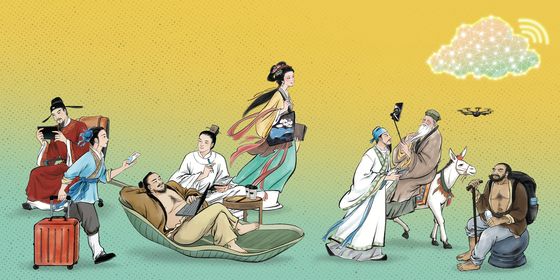Learn idioms of eloquence, trickery, and deceit—all inspired by the Battle of Red Cliffs
Over 1,800 years ago, a remarkable victory of the few over the many left a lasting mark on Chinese history and culture. The Battle of Red Cliffs, fought near the southern bank of the Yangtze River in present-day Hubei province, ultimately paved the way for the Three Kingdoms stalemate. It has been closely studied by historians and military strategists for centuries as a classic example of the weak defeating the strong, and has also inspired countless poems and literary works. The most popular depiction of the battle—featuring vivid characters, cunning strategies, dramatic plot twists, and an intricate interplay of fate and human nature—appears in the 14th-century novel Romance of the Three Kingdoms (《三国演义》) by Luo Guanzhong (罗贯中).
The epic tales of the battle traveled far and wide beyond the novel, through traditional operas, pingshu (book commentary), and other folk art forms. As a result, every detail of the battle, many of them embellished or invented in literary works, became widely known. This gave rise to a series of idioms and punning folk sayings that are still used today. Here’s a brief retelling of the popular folk version of the battle and the many sayings it inspired.
Delve into the history and lasting cultural impact of the Three Kingdoms:
- The City at the Heart of Three Kingdoms Power Struggles
- TV’s latest Zhuge Liang wins audiences with English
- What Video Games (Don’t) Teach Us About China
In the seventh month of the year 208, Cao Cao (曹操), the ambitious warlord of northern China, marshaled a colossal troop down south, attempting to crush the last resistance and claim all of China. After he took the city of Jingzhou and brought its navy under his command, Cao decided to sail east to attack his two biggest rivals, Liu Bei (刘备) and Sun Quan (孙权). But on the bank near Chibi, or the Red Cliffs, his campaign met an unlikely obstacle: Liu and Sun had established an alliance to fight back. What followed was an epic upset in the annals of Chinese storytelling—a battle not won by force, but by cunning, fire, and a fateful wind.
A war of words 舌战群儒
One of the most vivid idioms to emerge from the lore of the battle is 舌战群儒 (shézhàn qúnrú), literally meaning “a war of words against a group of scholars.” Though this dramatic scene never took place in actual history, it became iconic through literary retellings. In Romance of the Three Kingdoms, against the advancing forces of Cao, Liu Bei’s strategist Zhuge Liang (诸葛亮) visited Sun’s state to convince them to form an alliance. On the court, Zhuge had a legendary debate with a chorus of skeptical scholars and officials who opposed going to war.
These learned men confronted Zhuge with pointed arguments: some questioned Zhuge’s credibility and doubted Liu Bei as a reliable ally, while others suggested the safer path of surrender.
Zhuge systematically dismantled their arguments with razor-sharp rhetoric, comparing submission to kneeling before a thief, while highlighting Cao’s strategic weaknesses. His brilliant persuasion secured the crucial alliance that ultimately led to victory.
Today, this idiom is often used to capture the image of a single eloquent speaker triumphing over multiple opponents in a verbal battle. For example:
Going home for Chinese New Year always means fending off a barrage of marriage pressure from aunties and uncles.
过年回家,她总要舌战群儒,应对七大姑八大姨的催婚攻势。
Borrowing arrows with straw boats 草船借箭
Following the earlier story of Zhuge’s verbal prowess, another iconic episode from Romance of the Three Kingdoms highlights his military genius during the prelude to the battle. As the allied forces of Liu and Sun prepared their fire attack against Cao’s massive fleet, which had chained its ships together for stability, they faced a major shortage of arrows. Zhou Yu (周瑜), Sun’s chief commander, challenged Zhuge to produce 100,000 arrows within 10 days. With characteristic confidence, Zhuge promised to deliver them in just three days. As the deadline approached, Zhuge had 20 straw-stuffed boats rowed towards Cao’s camp on a foggy night. Shrouded in thick river fog, Cao’s army mistook the boats for attack vessels and ordered their archers to fire volley after volley of arrows, most of which lodged harmlessly in the straw-covered hulls. By daybreak, Zhuge returned triumphantly with his “borrowed’ arrows, which were over 100,000 in total.
While this ingenious stratagem appears only in the novel and not in historical records, “borrowing arrows with straw boats” or 草船借箭 (cǎochuán jièjiàn) has become one of China’s most beloved military ruses. Besides referencing this classic tale, the idiom is also used to describe the clever use of others’ resources to one’s advantage.
We didn’t spend a dime on advertising—our partner did the promotion. Talk about borrowing arrows with straw boats!
我们没花钱做广告,靠合作方宣传,算是草船借箭了。
All is ready except for the east wind
万事俱备, 只欠东风
Following the success of borrowing arrows, the allied forces faced another critical challenge to their fire attack. Zhuge and Zhou had prepared everything for their assault: flammable materials, attack boats, and a detailed plan. However, one final element is still needed: an east wind to carry the flames toward the enemy’s ships. It was this exact situation that gave rise to the idiom, “All is ready except for the east wind, or 万事俱备, 只欠东风 (wànshì jùbèi, zhǐqiàn dōngfēng).”
In the novel, this problem was solved by Zhuge, who built an altar, performed mysterious rituals, and successfully “summoned” the crucial east wind at the decisive moment, enabling the fire attack that destroyed Cao’s navy.
Today, this eight-character chengyu describes situations where all preparations are complete except for one crucial final element. For example:
Everything for our event was in place—just waiting for the final touch—and then you suddenly texted to say you’re not coming?
我们的活动万事俱备,只欠东风,你倒好,突然发信息说不来了。
Beyond idioms, the dramatic tales of the Battle of Red Cliffs also gave rise to many colorful xiehouyu—humorous two-part puns commonly used in casual conversation. The first part typically sets up the scenario, while the second delivers the punchline or underlying meaning. Sometimes, people say just the first part in conversations, trusting listeners to catch the implied meaning.
Jiang Gan steals the letter—got tricked big time
蒋干盗书——上了大当
Serving under Cao Cao, the strategist Jiang Gan was tasked with persuading Sun Quan’s forces to surrender. Jiang then paid a private visit to his old schoolmates, Zhou Yu, now Sun’s trusted lieutenant.
But Zhou saw through the ruse and staged a clever trap: After hosting a drunken banquet, he “accidentally” left a fake letter suggesting two of Cao’s best naval commanders were traitors, knowing Jiang would find it. As Zhou predicted, Jiang stole the letter and rushed back to Cao, who immediately executed the innocent commanders, severely weakening his naval leadership before the battle.
Today, this xiehouyu perfectly describes someone falling for an obvious trick:
I’m worried these two guys are trying to pull a “Jiang Gan stealing the letter” on me, so I need to follow them.
我担心这俩小子跟我玩蒋干盗书, 我得跟踪他们去。
Zhou Yu hits Huang Gai—one is willing to strike, the other is willing to take the blow
周瑜打黄盖——一个愿打一个愿挨
Perhaps the most widely known xiehouyu emerged from the tales of the Three Kingdoms, this expression revealed a more daring deception plot.
As the allied forces finalized their fire attack strategy, they needed someone to deliver the fatal blow to Cao’s fleet. Huang Gai (黄盖), a veteran general of Wu, volunteered for this mission. The plan was brilliantly sinister: Huang would pretend to defect to Cao’s side, but his ships would secretly be loaded with dry reeds, flammable oil, and other combustibles to launch the attack.
To make the defection convincing, Zhou and Huang staged a dramatic public confrontation where Huang openly challenged Zhou’s authority. In a performance worthy of an Oscar, Zhou ordered Huang to receive 50 heavy lashes, a punishment so severe it left the old general bleeding and barely conscious.
When news of this brutal punishment reached Cao, he was skeptical at first, but eventually bought the ruse. He eagerly accepted Huang’s “defection,” believing the general bore a genuine grudge against Zhou. On the night of the attack, Huang led a squadron of ships toward Cao’s fleet. As they approached the enemy formation, Huang’s crews set the ships ablaze and escaped on small boats, sending the fire ships crashing into Cao’s chained fleet.
This story of deception and sacrifice gave rise to the xiehouyu, now used to describe situations that seem harsh or unreasonable but actually involve mutual consent. For example:
She makes her boyfriend run out to buy bubble tea every day, and he’s happy to do it—classic Zhou Yu hitting Huang Gai!
她天天让男朋友跑腿买奶茶,他还乐呵呵的,这不是周瑜打黄盖吗?












